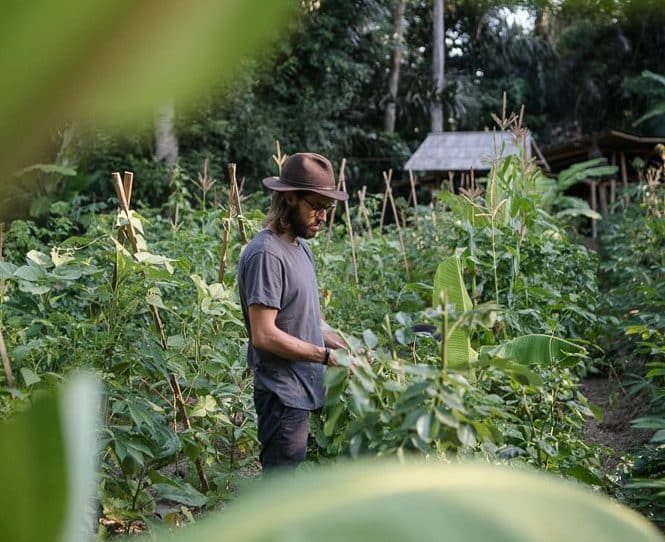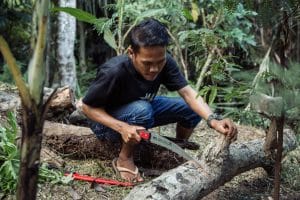Together with The Bridge at Green School we are excited to bring a world class Syntropic farmer here to Bali. Join us to learn how to grow forests following natural principles to feed people and regenerate ecosystems. This 4-day workshop will teach you how to implement and manage agroforestry systems following the Syntropic farming method. You will learn both theoretical and practical knowledge of agroforestry systems.
What is Syntropic Farming?
Syntropic farming was developed in Brazil by Ernst Gotsch (Swiss botanist) in response to deforestation and industrial agricultural practices. The word ‘Syntropy’ in agroforestry refers to “increasing complexity” and biodiversity within the system. A forest is a natural succession of plant species with the fast growing species creating conditions for slower growing plants to eventually establish themselves. Every species in a forest species has a particular ecological function and fills a different niche in the system. Ernst set about systemising the natural processes of the rainforest. He could see that he could create food forests by mimicking succession, while also reinvigorating soils on degraded land.
More of what you’ll learn
Understanding forest strata. We will explore how plants behave in their environment, considering the quantity and quality of light that the plants need to be healthy and the particular forest niche they thrive in.
Natural succession. To cultivate a forest it is important to see how plants behave across time. How long it takes them to reach their full life cycle and how long it takes until they reach maturity.
The importance of Mulching. It is essential that soil stay covered with organic matter to be fertile. We will teach people best mulching practices for maximum soil health.
Intercropping. We will demonstrate how to combine plants in an Agroforest, including examples on how to properly combine different species in one system.
Agroforestry Design. There will be a practical design exercise evaluating the producer’s goal regarding the quantity and type of products being produced and considering all variables of a property: climate, soil quality, ground leveling, positioning considering the sun, etc. We will also initiate the implantation of a new area that will become a food forest at The Kul Kul Farm.
Plant Propagation. Knowledge of best practices for the propagation of different plant species to create long-term health and productivity of individual plants.
Schedule
This course starts at 9:00 am and runs till 4:00 pm.
The course fee includes all tools materials as well as a delicious vegetarian lunch.
Your Teacher
Namastê Messerschmidt was born in 1987 in the state of Piauí Brazil. He is the son of a German father and Brazilian mother, At the age of 12, he moved to the Oca do Brasil Institute in Goiás, where he met Ernst Gotsch, the creator of Syntropic Farming. In that same year, he began to learn and work with the technique and remained there for 11 years. Around 2010, he started his activities with the indigenous people, with courses and consultations facilitated by ATIX (Xingu Indigenous Land Association), ISA (Socioambiental Institute) and INPA (National Institute of Amazonian Research). In parallel, he acts as a consultant and instructor in several organizations and with farmers, including: UN, MST (Landless Movement, largest social agrarian reform movement in the world), Fazenda da Toca (GPA – Pão de Açúcar Group), Cooperafloresta agroforestry farmers who have been living in agroforestry for 23 years. Since 2017, Namastê opened his agenda of courses and international consultancies to countries such as Australia, New Caledonia, Indonesia, Thailand, Angola, Argentina, Portugal, and France, spreading the knowledge of Agroforestry around the world.
This course is being run in collaboration with The Bridge at Green School Bali. If you are a bridge member you can visit the bridge from Monday to Friday to make payment and reserve your attendance. If have questions about the course please email [email protected]



